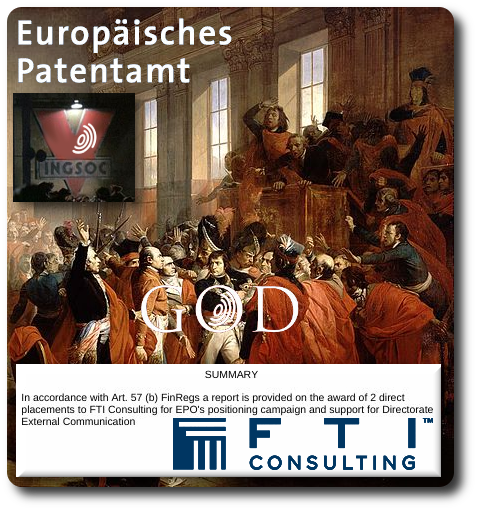

Napoleon Bonaparte surrounded by members of the Council of Five Hundred during the Coup of 18 Brumaire, by François Bouchot (drawing edited by us)
THE EPO's massive new propaganda budget (€880,000 in a year) is rather revealing (we included it in the image above). The EPO's management has managed to convince itself that perception -- not its behaviour -- is the real problem. This helps explain the war on information itself and the war on people who 'dare' to speak out. It's a war of occupation and forceful silencing of dissent thereafter.
"The EPO's management has managed to convince itself that perception -- not its behaviour -- is the real problem."A new article about judicial independence at the EPO was posted yesterday by Merpel. It speaks of the Praesidium of the Boards of Appeal. As Merpel put it: "The Boards take a very different view. Their Praesidium (overseeing body) has written to the AC members in frustration, disputing that they were properly consulted, and asking for their voices to be heard. Not unreasonable, given that it is they whose careers are on the line, and it’s their children who will have to move schools if they are relocated to Vienna, Berlin or anywhere else.
“...applicants in their droves are choosing to file their applications at the national offices...”
--Anonymous"Merpel reproduces the memorandum from the Praesidium below, which addresses the current proposal in depth, questions why their views have been largely ignored until now, and asks the AC to let the Boards present their views directly to the Council."
One can find the full text in there, but here is the summary: "The Presidium is of the opinion that the proposed measures do not achieve the declared aims of increasing the Board's autonomy and improving the perception of independence. What's more, certain elements even cast further doubt on their independence and make them less independent than before. The most important legal question has not been answered yet - that of whether the proposed delegation of powers from the President of the Office to the President of the BoA can take place under the EPC. Further crucial aspects such as autonomy in budgetary and communication matters are not addressed."
“...will the members of the Praesidium now be subjected to sessions with the Investigating Unit and subsequent disciplinary proceedings?”
--AnonymousThis article raises all sorts of interesting questions and attracts interesting comments too.
Citing Battistelli's crazy rules that deny access to his potential overseer (those who can sack him), one person asks, "will the members of the Praesidium now be subjected to sessions with the Investigating Unit and subsequent disciplinary proceedings?"
Here is a good comment:
Clearly, El Presidente is going for the big one: while he still can (before the political shit really hits the fan) he would like to 'reform' the BoAs in a 'reasonable' way which will 'extend their independence' by putting them at a physical distance from the rest of the administration.
This is, of course, the purest cant: as the assembled staff of DG3 point out, in common with his treatment of the rest of the EPO staff, Battistelli is at present deliberately trying to intimidate DG3 by:
1. Deliberately not filling vacant posts in DG3, which not only makes the allocation of work more difficult, but raises the question of who will be retained in post of those already in post;
2. threatening to move them to a new site (which, for reasons of service, they may not be able to oppose - see ServRegs, if you can find the relevant passages) - which may (will) ultimately lead to the resignation of many of these 'turbulent priests' (look it up).
Despite the apparent enshrinement in EPC of the independence of the boards, we see that there are, nevertheless, ways in which the president can apply pressure to DG3, even if this is not a direct pressure to individual members or chairman.
Is this really what the framers of the EPC intended? If not, Quo Vadis DG3?
“...it looks like the President intends to mislead and deceive the Council, his supervisory authority. If that is correct, I personally believe the Council should dismiss the President.”
--Anonymous"Unfortunately, the chances that the Council will do their job are slim. Some delegations will voice concerns, but in the end, the Council will very likely rubberstamp whatever the President has sent in. They have done it in the past, they will do it in the future. The only exception was the desired dismissal of the Board of Appeal member where they had obtained independent external advice.
"I will appreciate to be proven wrong, both on the President's intention and the Council's behaviour."
It will be interesting to see if, as some people have warned me, the EPO will soon attempt to buy opponents (there's a huge new budget for reputation laundering), which can in turn flip-flop on EPO coverage, either in expectation of monetary compensation or because a payment was quietly made. Watch out.
What looks like patent examiners or friends of some examiners are not exactly happy. "The story about a director effectively deciding a case looks quite incredible," one of them wrote. Another one wrote: "This is how their management understands quality. #EPC trampled and spat upon. Oh but to serve the citizen of course."
Congratulations to Sun King (Battistelli) for totally demolishing the EPO after Alison Brimelow left something which was at least working.
Protests by staff need to go on. There is at least one more next week. ⬆
"Ten people who speak make more noise than ten thousand who are silent."
--Napoleon Bonaparte